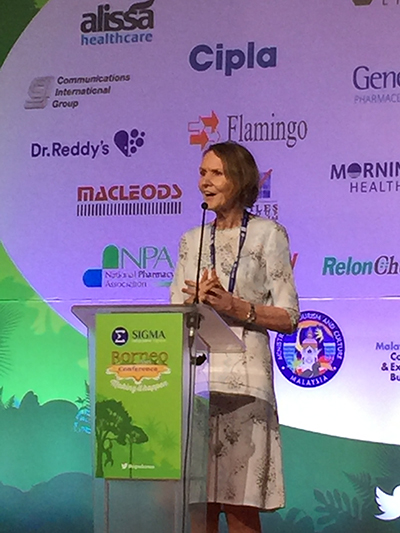Sigma Conference summary
In News
Follow this topic
Bookmark
Record learning outcomes
The 2018 Sigma conference was held this week, attended by key speakers and independent pharmacists. The presentations over three days included a range of views on ways to improve community pharmacy businesses, models for integration with the NHS and advice from succesful independent pharmacy owners, plus a message supporting the event from the Prime Minister. Here’s a quick look at some of the points discussed.
We need to make it happen. “This year our conference aims to focus on how we as a profession can make decisions and create opportunities and become catalysts for change. To make it happen we need to do it collectively as a force,” said Sigma’s Manish Shah and Kamal Shah, opening the conference. Pharmacy should be working in cooperation and not in isolation, said Sigma’s Bharat Shah, closing the conference.

Community pharmacy needs a new contract model. A care-based contract is essential to develop services around the supply function, said outgoing PSNC chief executive, Sue Sharpe. It would recognise prescription volume but also provide a stronger framework for pharmacists’ core role of enabling patients to get the best out of their medicines. Funding flows must be protected, she said. “It is evolution, not revolution, but it has to happen at pace.”
The NHS is changing rapidly. Are you? A process of re-engineering is going on in the NHS, said Hemant Patel, secretary of North East London LPC, which community pharmacy needs to keep pace with to not get left behind. “If pharmacy doesn’t fit into the new system it will be rejected. If it is not part of the new solution, it is part of the old problem. Pharmacists need to act, think and invest differently.” Community pharmacy’s biggest mistake has been to solely focus on medicines, while forgetting about what is happening elsewhere in the health service, Mr Patel suggested.

Would a centralised dispensing consortium model work for independents? What is the next step for us as independent pharmacies? asked Sigma’s Hatul Shah. “I pose the question if we can all pull together and dispense centrally for you in our warehouse in a consortium service model? NHS cuts are ongoing and we need to find better ways of improving our processes to sustain our businesses.” Time released in the dispensary could be used generating new revenue or out on the shop floor, he proposed.
EPS signals a “red alert” for community pharmacy. Electronic prescribing is a “red alert” that could enable warehouse dispensing and shouldn’t be ignored as a threat, Sue Sharpe warned. “EPS is the enabler of big remote supply chain operations. It has gone cold, but it hasn’t gone away.”
Radical solutions are needed for pharmacy’s future. New ideas, such as expanding pharmacy’s role in health screening for conditions such as hypertension and heart disease should be part of the professions strategy, said the National Pharmacy Association’s Ian Strachan.

How can joint working be made to happen? Opportunities for joint working with general practice should be developed if possible, suggested Dr Etheldreda Kong, a GP. Given the will, potential schemes could include sharing work to hit targets, such as health needs identified in Pharmaceutical Needs Assessments. “Create a truly joined-up primary care provider – general practices and pharmacies – you share the same population”, she said. Changes are needed to create a win-win for all in the new commissioning landscape, added Dr Kong.
Integration with local authorities? It is important that pharmacists know the key people in their local authorities, said Graham Jones, council leader and pharmacy owner, and look at opportunities to integrate as part of the local healthcare system. West Berkshire is a pilot site for health and social care integration, and initial results have been encouraging, he said. However, it is no mean feat to integrate number of local organisations, he said, commenting that generally “integration costs before it pays”, and will always take time to achieve, rather than being a short-term fix. “Be clear what problem you are trying to solve and ensure you can measure the benefits,” he suggested.

Working in a coordinated way across CCGs. GP pharmacists are being “parachuted in” to general practice with very little support, said PDA’s Mark Koziol. Having GP pharmacists in place as part of an overall CCG plan where it sits within a plan and considers a patient journey is much more appropriate, said Mr Koziol, and ensures that GP pharmacists “are doing what they are supposed to be doing”.
FMD is likely to increase generic medicine prices further. “In all honesty, I think that some prices will have to go up,” said Peter Ballard, chair of the British Generic Manufacturers Association (BGMA). “There’s a huge cost that has to be absorbed.” Part of the reason for current generic supply problems has been very low generic prices in the UK, creating an unsustainable market. Prices will adjust and return the market to stability, he said, and progress is being made in restoring the lost production creating supply problems. “We have to recognise that prices have come down too far.”
Pharmacy minister Steve Brine pledges to work with community pharmacy “I will continue, I promise you, to continue working with you and building on NHS England’s excellent pilot work looking how best to embed community pharmacies and pharmacists into the wider health service, to deliver a service that really is fit for the future. There will be further work on medication safety, including the launch of a new initiative, he said, which will focus on prescribing and medication errors.
Prime Minister recognises the role of community pharmacy. The Prime Minister, Theresa May, sent a message of support to the conference, saying “community pharmacies remain at the heart of patient care and community wellbeing”.

APPG to support pharmacy’s proposals for care-based contract. “I’m pleased to hear that community pharmacy is proposing a new service-based contract to the Department of Health. We are very clear that a contract on that basis is the only way to a sustainable future for community pharmacy. It is what patients want, it would help the NHS capacity problems and it makes best use of pharmacy expertise,” commented the All Party Pharmacy Group’s Sir Kevin Barron. Pharmacy organisations must work together to offer government one clear voice from the profession, he said.
Get the message across about pharmacy. Storytelling works well to communicate messages and is an important part of pharmacists’ skills that can be used to communicate with patients and to talk to commissioners and other health professionals about pharmacy, said Trevor Gore, Maestro Consulting. “Data is important but telling a story with emotion has a resonance that people notice and respond to. Different areas of your brain light up.”
Look to increase your OTC business. Community pharmacies could look to increase their OTC business to over 20 per cent of turnover, Sigma conference delegates heard from Dennis Reid of Retail Performance Specialists. But improving OTC and other areas of a pharmacy business needs an understanding of performance figures, because “what gets measured gets done”, he said. “You need to have the data and understand what it is telling you. What are you doing well and what could you be doing better?”

Get involved with pharmacy politics, before it’s too late. A lack of political engagement within pharmacy “will come back to bite us” said Manor Pharmacy’s Graham Philips. Don’t rely on the pharmacy organisations to do things for you, and get involved locally, he urged.
The time to bring about change is now! “This is it. It’s not going to get better unless you make the changes yourselves,” concluded Claire Ward, referring to the challenges ahead for community pharmacy. “You have no time to lose to protect your future, your family and your business. Hold those people who are leaders in pharmacy to account, and, the people who have griped about PSNC, where are you when we are looking for people to stand for nomination?” Take action to ensure that your businesses continue to prosper, urged Ms Ward.
Taking independent pharmacy to a new level
Four independents shared their advice for trying out new ideas and what has worked for them.
Make more of technology. “I would encourage all of you to think about technology,” suggested independent pharmacist Bernadette Brown from Cadham Pharmacy. It’s not the gadgets that people like, it is what you do with them – the time that it gives you to help the public.”
Give patients the best experience. “We aimed to be so welcoming to the customer: feeling that they are coming into our home”, said independent pharmacist Terry Reid. “Start with a compelling story line, one that will first empower you, and share that with the team and help them take ownership of it.”
Consider new revenue streams. Setting up an aesthetic medicine clinic at the pharmacy and becoming aesthetic medicine practitioner has not been without its challenges, said independent pharmacist Amish Patel, but active social media and a pricing strategy has helped achieve success. The team have now added a mole clinic, and dermatology services.
Improve your business to attract more customers. A refurbishment of Ross Pharmacy attracted customers that would have previously walked past to another pharmacy next door, said independent pharmacist Sonia Shah. New PGD services, including a successful travel clinic, have helped to retain those new customers.
